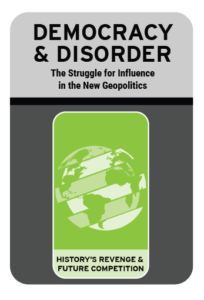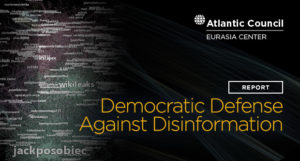 As Russia, China, and other states advance influence through forms of digital authoritarianism, stronger responses are needed from the U.S. and like-minded partners to limit the effects of their efforts, says a new report.
As Russia, China, and other states advance influence through forms of digital authoritarianism, stronger responses are needed from the U.S. and like-minded partners to limit the effects of their efforts, says a new report.
Digital authoritarianism — the use of digital information technology by authoritarian regimes to surveil, repress, and manipulate domestic and foreign populations — is reshaping the power balance between democracies and autocracies, according to Brookings analysts Alina Polyakova and Chris Meserole.
China and Russia have developed and exported distinct technology-driven playbooks for authoritarian rule. Beijing’s experience using digital tools for domestic censorship and surveillance has made it the supplier of choice for illiberal regimes looking to deploy their own surveillance systems, while Moscow’s lower-cost digital disinformation tools have proven effective in repressing potential opposition at home and undermining democracies abroad, they write in Exporting digital authoritarianism.
For decades, the widespread hope and expectation outside of China was that capitalism would make the country more like us, notes Richard Bernstein, the author, most recently, of “China 1945: Mao’s Revolution and America’s Fateful Choice.” But as Johan Lagerkvist gloomily points out in Tiananmen Redux, something like the reverse has actually happened. Rather than China being Westernized, the West is being Sinicized, he writes for The Wall Street Journal.
 “It would be imprudent,” he writes, “to ignore the fact that the world may indeed become more authoritarian and parochially nationalistic despite, or precisely because of, the effects of neo-liberal globalization.”
“It would be imprudent,” he writes, “to ignore the fact that the world may indeed become more authoritarian and parochially nationalistic despite, or precisely because of, the effects of neo-liberal globalization.”
To build resilience against foreign influence operations in democratic societies, governments should consider a number of counter-measures, the Brookings analysis suggests, including:
● Export controls. Although China can match the U.S. in software quality, it has yet to master semiconductor manufacturing. Some of the equipment that China relies on
for mass surveillance systems incorporate advanced processors and sensors that are only produced in the west. The U.S. and Europe have already begun restricting the export of such technologies to China and should consider expanding the use of export controls.
● Targeted sanctions. The United States should designate regimes as “digital authoritarian” if
they routinely and purposefully employ mass surveillance without adequate safeguards
and protections. Firms that supply digital authoritarian regimes should be sanctioned
heavily—not just those in Russia and the U.S., but also companies based in the United
States and Europe.
●  Democratic models. Where the export of digital authoritarianism is concerned,
Democratic models. Where the export of digital authoritarianism is concerned,
sanctions alone won’t be enough to check its spread. Ultimately, the West will
need to develop a democratic model of digital governance that can out-compete
authoritarian ones. To do this, the technology sector and policy-making community in the
United States and Europe will need to offer compelling models of digital surveillance that
enhance security while still protecting civil liberties and human rights.
● Digital governance code of conduct. The U.S. and Europe should work to develop
common practices, rules, and systems of digital governance. A coalition of democratic governments, tech companies, and civil society should develop a code of conduct
which should include an articulation of operating procedures for addressing social
media manipulation, common terms of use across platforms, and shared rules on
personal data use.
●  Public awareness. To build resilience against foreign influence operations in democratic societies, governments should invest in raising public awareness around information manipulation. This should include funding of educational programs that build digital critical thinking skills among youth.
Public awareness. To build resilience against foreign influence operations in democratic societies, governments should invest in raising public awareness around information manipulation. This should include funding of educational programs that build digital critical thinking skills among youth.
The Council of the EU recently created a new, permanent diplomatic group to monitor and respond to “hybrid” threats like misinformation, fake news campaigns and election interference attempts, POLITICO reports.
The Commission’s new chief Ursula von der Leyen has already said in her political guidelines that she aims to propose a “European Democracy Action Plan” that “will address the threats of external intervention in our European elections,” including protecting it from disinformation and interference.
Authoritarian Tech
 James Bridle’s New Dark Age: Technology and the End of the Future argues that digital technology has, among other things, reduced our ability to know and act on the present, notes analyst Eduard Saakashvilli. This is a paradox, he writes for Coda Story:
James Bridle’s New Dark Age: Technology and the End of the Future argues that digital technology has, among other things, reduced our ability to know and act on the present, notes analyst Eduard Saakashvilli. This is a paradox, he writes for Coda Story:
The proliferation of data, the universal availability of more and more information, and the increased sophistication of computer models all suggest the opposite. But, to Bridle, when life gets digitized, we lose sight of it. Crucially, this distortion is political. When we pass the world through a technological lens, we get a version that reflects the political views of those who created the technology. Twitter, say, reflects a certain view of what a public sphere means, how political discourse happens, and what a user is interested in seeing.
Technology is a tool, but it is a tool shaped heavily by corporations and governments with specific political agendas, Saakashvilli adds. The technology we use, in turn, shapes our view of the world, our ability to make decisions, and circumscribes the realm of political possibility.







